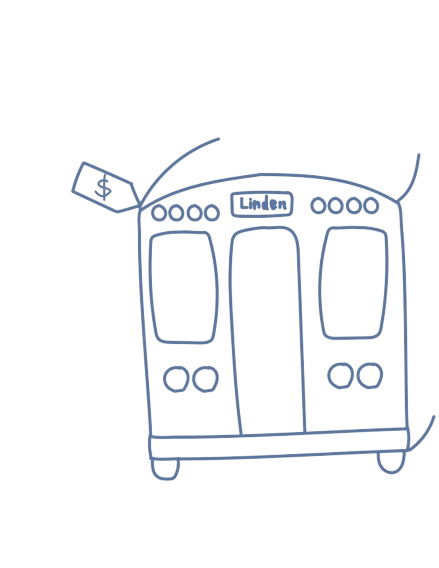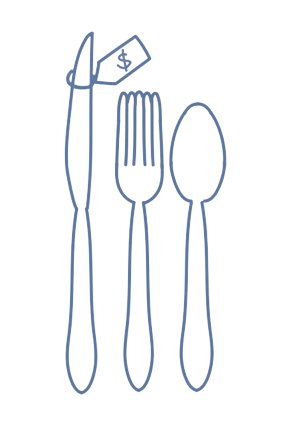Growing up in Brazil, Weinberg second-year Maia Montemagni says a large portion of her mom’s salary went toward paying for her primary school education. International schools were too expensive for Montemagni’s family, but she received a scholarship to attend a top high school in her area.
Now at Northwestern, Montemagni is among the 20.5% of the Class of 2024 that is eligible for the Pell Grant, a federal grant program for students from low-income families, according to the University’s 2020-21 Diversity Report.
Weinberg second-year Agustin Bayer followed a similar path to Northwestern. Near the end of high school, he worked 30 hours per week on top of AP and honors classes to cover his living expenses. He says he wasn’t sure he would be able to afford college until his counselor introduced him to an opportunity for a full-ride scholarship through QuestBridge.
In Fall 2021, Montemagni and Bayer co-founded the Personal Finance Student Association (PFSA). Through the group, they hope to build a community that helps fellow students increase their financial literacy in college and beyond.
The quintessential college experience is traditionally centered around finding community, whether through common interests, shared meals or social outings. But at Northwestern, these activities often require money. Cost can pose a pivotal barrier in shaping low-income students’ social lives, even with strategic budgeting.
A different kind of culture shock
Considering an imaginary trip to Chicago, SESP second-year Emily Lester sets aside $35 for an event with an admission fee of $25. But then, she adds the additional costs of grabbing a coffee, eating dinner and getting dessert. Her fictitious $35 trip has turned into an $80 expense.
“There have been times where I have to kind of act like I don’t want to go,” Lester says. “It seems like it’s almost a reflection of my personality and a reflection of what I want my social life to be, when really I am just trying to think about money.”
Lester grew up in Lebanon, Missouri, a rural manufacturing town with an average household income of $39,911 as of 2019. She identifies as low-income but says that she is “middle-class passing.”
In her hometown, Lester says most students enter the workforce after high school, and those who do pursue higher education typically go to state schools. However, after attending a camp with Northwestern’s Center for Talent Development in middle school, Northwestern became Lester’s dream school. Yet, even when her college aspirations became reality, she still faced barriers when forming connections with many of her peers.
Lester says that many students bond over experiences like concerts and international vacations. At Northwestern, she notices people taking weekend trips with their parents or going into Chicago. While she would love to have these experiences, she says they wouldn’t be financially feasible considering her typical budget.

“I had to almost brand myself as the girl who was low-income from Missouri so that they’d understand why I wasn’t showing that side of myself,” Lester says.
Communication first-year Kiara Hill says the Northwestern community sharply contrasts with her hometown of Jackson, Mississippi. Growing up, she says she always knew everyone around her and kept the same group of longtime friends.
“I came from an area where I’m surrounded by Black people that look like me,” Hill says. “So here it was a culture shock just seeing everyone different and not having that close, tight-knit community that I was used to.”
Hill identifies as low-income, and in her hometown, she and her friends spent their time coming up with cost-free activities or going to one of the few nearby museums, she says. At Northwestern, Hill formed friendships with peers diverse in both identity and socioeconomic status. Unlike her high school friends, Hill says her college friends often ask her to go out multiple times a week, which she can’t always do.
“I had to almost brand myself as the girl who was low-income from Missouri.”
SESP second-year Emily Lester
“I find it difficult because I don’t like telling people no,” Hill says. “I want to hang out, and I want to make friends and things like that, but I also know myself — I just don’t have the type of budget to be able to do that.”
While declining invitations can lead to guilt, Hill says that her number one priority is recognizing that saying no is OK and not something to feel bad about.
“If you find some good people, they’ll understand,” Hill says. “[We’ll do] simple things like going to a park. Or I’ll even go out shopping with them, but maybe I won’t get anything. I’m just there for the experience and for the camaraderie.”
Balanced budget
When Montemagni started her first quarter at Northwestern, she didn’t have any experience with American taxes. She needed to file tax returns for the full financial aid package she received from Northwestern but couldn’t access the necessary campus resources since her first year was virtual. She tried to contact Student Enrichment Services (SES) but was told that they didn’t offer tax help. She says this struggle motivated her to create the Personal Finance Student Association (PFSA).
“It was really complicated and really difficult,” Montemagni says. “So I felt like there was a need for a community of people who are in the same boat and interested in managing [their] finances in a responsible way.”
However, taxes are not the club's sole focus. PFSA also covers topics like budgeting, long-term planning, setting funds aside for personal expenses and managing social activities.
McCormick third-year Matt Schilling says he hasn’t heard of PFSA but would be interested in joining, especially considering the club’s guidance on filing taxes. Like Montemagni, Schilling is on a full scholarship. Because his scholarship exceeds his tuition, he receives tuition refund checks from Northwestern, which are directly deposited into his bank account.
“I can still remember the first two quarters of freshman year after the dorm and food or meal plan, you get eight to nine hundred bucks,” Schilling says. “And that has to cover textbooks, and at the time, I was also paying for my cell phone plan.”

After the pandemic prompted him to move to an off-campus apartment in the spring of his first year, Schilling’s tuition refund increased to $6,300 a quarter and then to $6,500. His checks go toward rent, groceries and general living expenses. He usually makes a spreadsheet with columns for the three months of each quarter with rent, utilities and subscriptions as expenditure categories. From there, Schilling looks at his refund and his balance, using spreadsheet functions to calculate his remaining spending money. Still, he says there are limitations to his budgeting system.
He recounts a time near the end of Fall Quarter his first year when one of his friends was organizing a team for the White Space Product Development Challenge, a cross-university problem-solving competition. To prepare for the challenge and to get to know each other better, the team went to Table to Stix, a ramen restaurant in downtown Evanston. Schilling says that he wanted to go, but his budget was squeezed so tightly that he wasn’t able to afford the meal.
“I just kind of went along with it, but when we got there, I didn’t order anything,” Schilling says. “It felt kind of awkward, but at the same time, what else was I supposed to do?”
Widened disparity
During the pandemic, Professor James N. Druckman recalls seeing people gather on porches to socialize outdoors, using large space heaters for warmth in the sub-30 degree weather.
“They have the space, and they have the resources to do that,” Druckman says. “It’s an example of something that’s not available to people without resources, because [a space heater] is a pretty luxury item.”
Druckman notes that lack of access to safer social opportunities likely creates anxiety for low-income students. Druckman is the Payson S. Wild Professor of Political Science, a Faculty Fellow at the Institute for Policy Research at Northwestern and a co-principal investigator for the COVID States Project, a multi-university research group launched in March 2020 that analyzes the links between social behavior and the coronavirus. Part of his research focuses on how the pandemic has isolated low-income individuals, and he speculates that this effect may be especially prominent at Northwestern, given its socioeconomic divisions.
“It’s fairly well-researched and documented that people from lower income brackets who go to elite schools [with] people from high income brackets face a lot of what’s called ‘striving to fit in,’” Druckman says. “That leads to mental health challenges, because it’s a big cognitive load to try to adapt culturally and lifestyle-wise to being surrounded by people from a very different socioeconomic [stratum].”
“We shouldn’t let the fact that we come from a less affluent background keep us down or make us feel that we don’t belong here at Northwestern.”
Weinberg second-year Agustin Bayer
For students like Montemagni, who spent her first year at Northwestern behind a computer screen, Druckman speculates that social isolation is magnified. He says the pandemic only exacerbated pre-existing socioeconomic inequalities.
Bayer believes that, regardless of these challenges, low-income students shouldn’t be defined by their socioeconomic status.
“We shouldn’t let the fact that we come from a less affluent background keep us down or make us feel that we don’t belong here at Northwestern,” Bayer says. “Sure, there are going to be some differences in difficulties, but what we want to do is help people overcome those in the best way that we can.”
The search for aid
During Schilling’s first year, a constrained budget forced him to pick between competing with the Northwestern Track Club and visiting family.
Then, he found out about the Student Activity Assistance Fund (SAAF).
“It looked like I was only going to get to do one of those things because with flight prices, it’s just not feasible,” says Schilling. “But then I realized if I did SAAF, I could do both. I put the flight to Nationals on SAAF and basically reused the money to go to see my grandma.”
SAAF, formerly known as the Student Activities Scholarship Fund, was established in 2012 to remove financial barriers for students who want to participate in campus clubs and organizations. The fund is completely supported through private donors and allots students up to $600 each academic year for dues, travel fees or other expenses. Schilling has also used SAAF to purchase running shoes for track practices.
Joe Lattal, the associate director of Student Organizations & Activities, is responsible for managing SAAF’s budget. He stresses the importance of maximizing the fund’s usage so it can support as many students as possible.

“At the end of the year, we use every single penny of it,” Lattal says. “When our colleagues in the Development Office approach donors about this opportunity, they can show that this is something that is being utilized, and it’s being utilized well.”
Joe Lattal, the associate director of Student Organizations & Activities, emphasizes the importance of spreading awareness about SAAF and its extensive effort to remove obstacles for students trying to get involved in enriching experiences outside of academic life.
“We want co-captains [and] exec boards to include mention of SAAF anytime they bring up personal expenses,” Lattal says. “We want to support as many students getting involved in these activities as possible. The students and advisors that relay this message for us throughout the year have been real allies in that effort.”
In addition to SAAF, Student Enrichment Services (SES) is another Northwestern resource that aids low-income students. Through the SES One Form, students can apply for funding for necessities like winter gear, textbooks and groceries. SES provided Hill with money to purchase a winter coat. For Lester, it meant she could afford a laptop loan.
However, Bayer says that it is sometimes unclear what expenses these services cover. Furthermore, he says SES staff turnover has made it difficult to build connections with workers — many of the staff that he had developed relationships with left before the start of the current academic year.
Daviree Laurel Velazquez Phillip, the executive director of Campus Inclusion and Community, says that out of their five full-time staff members, two departed during the 2021-22 school year, and one has become part-time. Phillips says that she is in the process of hiring new staff. Currently, the staff includes two graduate assistants and a member of AmeriCorp Vista, a government nonprofit employment program.
Efforts toward understanding
In her spare time, Hill likes to attend free jiu jitsu classes in the Henry Crown Sports Pavilion. When the weather is right, she and her friends meet outside and play in the snow. Afterwards, they’ll go to Norbucks to grab hot chocolates and hang out. Some nights, they’ll congregate in one of their rooms and watch a movie.
“You find different things to do, whether that’s just walking around exploring new buildings or meeting up together like in the CRC lounge and playing pool or ping pong,” Hill says. “It’s pretty fun.”
“I think that sometimes when you come from a place of privilege, you can sort of be stuck in your bubble.”
Weinberg second-year Maia Montemagni
One of Schilling's favorite activities is visiting museums, though he only goes when there is free admission. When he's not exploring museum exhibits, Schilling likes to do a little shopping, which he categorizes as a non-recurring expense.
Hill and Schilling believe that money is not always a requisite for having fun or finding community. Still, Montemagni says that it may be difficult for wealthier Northwestern students to recognize when their friends are struggling with affordability.
"I think that sometimes when you come from a place of privilege, you can sort of be stuck in your bubble," Montemagni says. "And even though you understand poverty, you know what it is, it can he hard to identify it and hard to have empathy with it. I don't think a lot of the privileged students at Northwestern really understand what it's like to just not be able to afford the social activities that they pursue."

Bayer hopes that PFSA will help students to better empathize with their peers. He emphasizes that the group is not exclusive to lower income students — it’s a community where all students can gather and learn from each other. By having conversations about finances and backgrounds, students can break down barriers that hinder mutual understanding.
“Even affluent kids are going to have to learn how to manage their own finances. That’s something everybody has to do,” Bayer says. “I think that as [students] learn and rub shoulders with other people who might have been their classmates already but they just didn’t notice were in different circumstances, we will have a more understanding student body.”